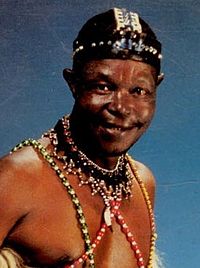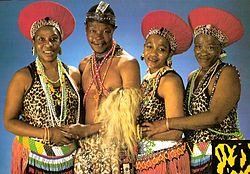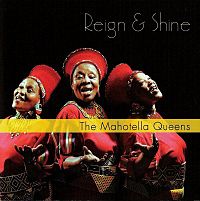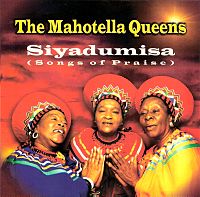- Mahotella Queens
-
Mahotella Queens 
Mahotella Queens, 2010
Left to right: Nobesuthu Mbadu, Hilda Tloubatla, Mildred MangxolaBackground information Origin Johannesburg, South Africa Genres Mbaqanga, Mgqashiyo Years active 1964–1971 (five ladies)
1971–1982 (new group of five ladies)
1983–1985 (reunion of five original ladies)
1986–present (three of original five)Labels Gallo Record Company (1964–2005)
AS Entertainment (2005–present)
AS Records (2005–present)Members Hilda Tloubatla
Nobesuthu Mbadu
Mildred MangxolaPast members Ethel Mngomezulu
Juliet Mazamisa
Emily Zwane
Caroline Kapentar
Thandi Rad'''ebe
Irene Mawela
Thandi Nkosi
Beatrice Ngcobo
Nunu Maseko
Francisca Mngomezulu
Mary RabotapiThe Mahotella Queens are a South African singing group formed in 1964 (and still together today) comprising Hilda Tloubatla, Nobesuthu Mbadu and Mildred Mangxola. The group is noted for their clear three-part harmonies, Mbaqanga township music and fast-paced mgqashiyo dancing.
The Queens were formed by the famed South African talent scout Rupert Bopape, at Gallo Record Company, in 1964, and would go on to have many hits at Gallo's African music division, Mavuthela. Throughout the 1960s, the Queens' line-up usually comprised Hilda Tloubatla, Juliet Mazamisa, Ethel Mngomezulu, Nobesuthu Mbadu and Mildred Mangxola. They were backed by the Mavuthela house band, the Makhona Tsohle Band (comprising several talented instrumentalists including Marks Mankwane on lead guitar and West Nkosi on saxophone), and fronted by the deep-voiced Simon "Mahlathini" Nkabinde. After 1971, growing competition from rival groups saw the Queens' line-up fluctuate considerably, and after a string of mildly-successful late '70s hits, the original five Mahotella Queens regrouped with Mahlathini and Makgona Tsohle in 1983. After one more hiatus, three of the Queens - Hilda Tloubatla, Nobesuthu Mbadu and Mildred Mangxola - regrouped permanently.
Although Mahlathini, Marks Mankwane and West Nkosi died between 1998 and 1999, the three Queens continue performing and recording - well into their 60s - to this day.
Contents
History
The early years
The Mahotella Queens, originally, was just a recording name, with Gallo Record Company bringing together several different female session singers from their African music production base, Mavuthela Music.[1] Five of these usually sung the main harmonies. The Queens' members were studio singers before 1963, with many (including resident lead singer Hilda Tloubatla) having recorded backing tracks for Gallo artists.
The group was formed by Rupert Bopape, a music producer and famous talent scout at the Mavuthela division. Bopape first invited along 22-year old Tloubatla after hearing her singing at the South African Broadcasting Corporation, closely followed by 18 year-old Mildred Mangxola and later on, 19 year-old Nobesuthu Mbadu. Also joining the group were Juliet Mazamisa, Ethel and Francisca Mngomezulu, Mary Rabotapi (previously a member of Miriam Makeba's backing group The Skylarks) and Nunu Maseko. When the Queens line-up was complete, Bopape combined the group with the 'king of the Groaners', Simon Mahlathini Nkabinde (known for his gruff, 'groaning' voice), and the Makgona Tsohle Band, the first exponents of mbaqanga music.
Throughout the 1960s and early '70s, Mavuthela usually selected five singers from their stable of contemporary female groups, but five members were almost certainly present on most recordings: Hilda Tloubatla, Juliet Mazamisa, Ethel Mngomezulu, Nobesuthu Mbadu and Mildred Mangxola.[1]
 The late Simon Mahlathini Nkabinde, "king of the groaners", 1988.
The late Simon Mahlathini Nkabinde, "king of the groaners", 1988.
The very first line-up of the Mahotella Queens had their first hit with Mahlathini and the Makgona Tsohle Band with the 7" single, "Sithunyiwe" which introduced mbaqanga, a type of music that fused marabi (South African jazz) and choral music with sounds of South Africa. This evolved into their own unique style of mgqashiyo, the Queens' no-nonsense fast-paced dancing (and harmonies) combined with the leaps, grunts and powerful vocals courtesy of Mahlathini. The group would have hits throughout the 1960s on the Gallo/Mavuthela label Motella, with songs such as "Sengikhala Ngiyabaleka", "Sikhulekele", "Sithunyiwe Thokozile No. 3" and "Umculo Kawupheli". Many of these songs were re-recorded in 1986 for their reunion album Thokozile.
Split
In 1971, several of the original Queens' members departed to care for their families. As a result, the remaining Mahotella personnel (including Nunu Maseko, Hilda Tloubatla and Nobesuthu Mbadu) joined rival groups such as Izintombi Zesimanjemanje.[1] Mahlathini went to EMI to record with two groups; the Mahlathini Girls, his own backing singers, and Ndlondlo Bashise - "The Mahlathini Guitar Band". West Nkosi, the saxophone and pennywhistle extraordinare of the Makgona Tsohle Band became a music producer at Gallo, where he most famously brought an unknown choral group to the label in 1972 - the then-unknown choir Ladysmith Black Mambazo. An entirely new line-up of Queens were roped in to replace the original members. They were Emily Zwane, Caroline Kapentar, Thandi Nkosi, Thandi Radebe and Beatrice Ngcobo.
Three of the original Mahotella Queens (Hilda Tloubatla, Nobesuthu Mbadu and Mildred Mangxola) re-grouped with the newer members in 1975, perhaps for something of a publicity stunt (footage of their comeback is contained on the VHS and DVD release Mahlathini, Mahotella Queens and Makgona Tsohle Band: Mbaqanga, at its Best!, GMPV 9). The group then released a highly successful album, Marriage is a Problem (reissued in 1990 on Shanachie Records).
After this was over, Tloubatla, Mbadu and Mangxola all left once more. The Queens line-up fluctuated over the next five years, with singers such as Irene Mawela (who would later go on to have a successful solo career) joining the group. Their 1977 release, Izibani Zomgqashiyo (reissued in 1986 on Shanachie), was partly successful, but was (for the most part) a failure in South Africa. This was due to mbaqanga music (and other, traditional music) being phased out by Western styles such as pop and disco.[1]
World popularity
 Mahlathini and the Mahotella Queens, 1988. (L to r): Hilda Tloubatla, Mahlathini, Nobesuthu Mbadu, and Mildred Mangxola.
Mahlathini and the Mahotella Queens, 1988. (L to r): Hilda Tloubatla, Mahlathini, Nobesuthu Mbadu, and Mildred Mangxola.
In 1983, Marks Mankwane reunited five of the original Queens for full-time recording with Mahlathini; Hilda Tloubatla, Juliet Mazamisa, Ethel Mngomezulu, Nobesuthu Mbadu and Mildred Mangxola. Their comeback release, Amaqhawe Omgqashiyo (reissued internationally in 1984 on Celluloid, under the title Isomiso), was a success. This was partly because a more heavy drum beat (and the addition of more prominent keyboards) was incorporated into the mbaqanga sound.
After another hiatus, the group reunited once more, in 1986. This was due to the explosive interest in South African music following Paul Simon's massively successful Graceland album, in which Simon collaborated with acts such as Ladysmith Black Mambazo, Stimela, Miriam Makeba, Hugh Masekela and many more. In this next incarnation of Mahlathini & the Mahotella Queens, the five ladies were pared down to three - Hilda Tloubatla, Nobesuthu Mbadu and Mildred Mangxola. Mahlathini & the Queens hit platinum with their first record aimed at the international market Thokozile. Outside of South Africa, many people suddenly became drawn to this music - the driving beat of mgqashiyo (the "indestructible beat"). Over the next 15 years, they would have hits with Paris - Soweto, Mbaqanga, Rhythm and Art, Stoki Stoki and Umuntu.
Tragedy and a new era
Mahlathini's health had been steadily growing worse since the mid-1990s, and the group delivered their last live performance as a whole group in 1997. A tragedy struck soon afterwards; their co-producer and former band member West Nkosi was killed in a car crash in 1998. On the very day they buried Nkosi, their lead guitarist and arranger Marks Mankwane died. The group had to continue, and recorded the album Umuntu in tribute to their late friends. However, in July 1999, the biggest tragedy occurred for the group: Simon Mahlathini Nkabinde died as a result of a diabetic condition.
After only a few weeks, the Queens returned to singing, performing and recording, in hope of keeping Mahlathini's spirit alive. They had decided they couldn't stop singing after so many years. In 2001, they recorded the highly successful Sebai Bai, which included a vocal performance of the track "Masibambaneni", a song they originally performed with Mahlathini seven years earlier and which spoke of blacks, whites and other colours joining together to create a peaceful South Africa (following the end of Apartheid). Other tracks included the title song (named after a young Sotho girl), "Dlhaya Mhunu" (which pleads with people not to murder others) and a re-recording of "Dilika Town Hall". Dedicating the album to Mahlathini and the old Makgona Tsohle Band, the Mahotella Queens had formed a new backing band: Victor Mkhize on lead guitar, Madoda Ntshingila on bass guitar, Makhosonke Mbuyisa on keyboard, Regis Gizavo on accordion, and Theko Masitenyane on drums.
Reign & Shine
 The Mahotella Queens' album Reign & Shine (2005).
The Mahotella Queens' album Reign & Shine (2005).
On 31 August 2005, the Queens released Reign & Shine, an album – their third since Mahlathini's death – that focused on vocal singing and only featured the backing band sporadically. Backing them was Texan Thusi on lead guitar, Madoda Ntshingila on bass guitar and Veli Shabangu on percussions. The album was a moral recording, with messages of ending child rape ("Muntu Wesilisa" - "Men, We're Talking to You"), begging for a cure for HIV-Aids ("Saphel' Isizwe" - "Disease All Over the Nation") and asking children to obey traditional beliefs ("Siyancela" - "We Are Pleading With You"). Note: "Sela Ndini" is actually track 8 on the album, whilst "Saphel' Isizwe" is actually track 2 - in the album booklet and on the inlay, the titles and descriptions have been swapped around.
Siyadumisa (Songs of Praise)
 The Mahotella Queens' album Siyadumisa (Songs of Praise) (2007).
The Mahotella Queens' album Siyadumisa (Songs of Praise) (2007).
The latest album from the Queens, Siyadumisa (Songs of Praise), was released in May 2007. It is one of their first albums to feature a religious theme throughout. During the making of the album, their bass guitarist Madoda Ntshingila was injured in a car accident, and at the last minute the acclaimed bassist Jabu Sibumbe was roped in to replace Ntshingila.[2] A tragedy also occurred during the production: the Queens had recruited a new lead guitarist, John Papo, whom they described as "very beautiful [...] we finally found a guitarist that plays like [the late] Marks Mankwane, our first guitarist. It's like you're listening him!".[2] Tragically, the young Papo died suddenly in February 2007.
The album features rearranged versions of traditional Zulu hymns such as "Usathane Uyadelela"[3] as well as new songs such as "Ebenezer" (the opening song sung by the Queens during live performances) and "Lenjabulo". Also included is a re-recording of one of the Queens 1980s hits, "Bonang Suna".[3]
Touring
History
The Mahotella Queens have been touring since the 1960s and, with male 'groaners' such as Robert Mbazo Mkhize and their long-term lead singer Mahlathini, have sold out shows in South Africa, the United States, Europe, Asia, and Australia. Their international touring career started in 1988, beginning with concerts in the United Kingdom (most notably the Nelson Mandela 70th Birthday Concert in Wembley Stadium) and North America.
Today
The Queens commenced a tour of Britain as the support act for Ladysmith Black Mambazo in May 2006, and completed it on June 10, 2006. The Queens performed a special 'a cappella' set, accompanied by successful percussionist Veli Shabangu. The Queens toured France, Germany and Asia, with the complete backing band, from June 26 - July 23, 2006.
The Queens also headlined WOMAD 2006, which was held over three days (July 28–31, 2006), singing signature songs such as Kazet.
The Queens completed a tour of Europe on August 25, 2007 [4] in which they performed at various WOMAD 2007 festivals. The Queens also performed at venues at home in South Africa as well in the US during late 2007 and 2008.
The Queens have appeared as part of Pee Wee Ellis's show Still Black, Still Proud: An African Tribute to James Brown for the last two years. Their next performances were in Europe throughout May and April 2010, as well as further performances in autumn and winter. As part of this European tour schedule, South African jazz legend Hugh Masekela joined forces with the Queens for a special UK tour for November 2010. The main show was in London on 12 November 2010, at the Southbank Centre's Royal Festival Hall. The show was part of the London Jazz Festival in association with BBC Radio 3, and was completely sold out.
Discography
Main article: Mahlathini and the Mahotella QueensThe Mahotella Queens are prolific recording artists, dating back to their 100+ sides recorded under various names for Gallo-Mavuthela in the 1960s and the 1970s. The Queens remained with Gallo until 2005 when they left the company, to be brought under the wings of AS Entertainment (headed by former Gallo managing director Antos Stella). Despite the fact that the Queens have recorded phenomenally,[1] only a handful of their South African recordings are available to purchase outside the country, as most have now been discontinued and not reissued, in spite of the rise of a small "crossover" audience in South Africa. Some older recordings have been made available on CD and the Internet in recent years, but the majority of available recordings made by the group has been material recorded for and aimed at the international market.
See also
Simon Mahlathini Nkabinde
Mahotella Queens: Hilda Tloubatla · Nobesuthu Mbadu · Mildred Mangxola
Makgona Tsohle Band: Marks Mankwane · West Nkosi · Joseph Makwela · Lucky Monama · Vivian Ngubane · Phillemon Hamole · Joey Mabe · Teaspoon Ndelu · Marubini Sam JagomeDiscography Studio albums Meet The Mahotella Queens (1964) · Let's Move With Makhona Tsohle Band (1967) · Isigubu Sabalozi (1969) · Phezulu Egqhudeni (1975) · Umculo Kawupheli (1975) · Marriage Is A Problem (1975) · Walk to Jo'burg (1976) · Best Of The Mahotella Queens (1977) · Izibani Zomgqashiyo (1977) · The Webb · Tsamaya Moratuoa (1980) · Thatha Izimpahla Zakho (1980) · Tsa Lebowa (1982) · Khwatha O Mone (1983) · Amaqhawe Omgqashiyo (1983) · · Mathaka Vol 1 (1983) · Kotopo Vol 2 (1983) · Pheletsong Ya Lerato (1984) · Ulungile (1984) · Ejerusalem Siyakhona (1986) · Thokozile (1986) · Paris - Soweto (1987) · Menate Ea Lefatse (1987) · Melodi Yalla (1988) · Rhythm & Art (1990) · Mbaqanga (1991) · Women of the World (1993) · Stoki Stoki (1994) · Umuntu (1999) · Sebai Bai (2001) · Bazobuya (2004) · Reign & Shine (2005) · Kazet (2006) · Siyadumisa (Songs of Praise) (2007)Compilations The Best of Mahlathini and the Mahotella Queens (1991) · The Best Of: The Township Idols (2003) · The Very Best of the Mahotella Queens (2005) · The Hits (2006)
Related articles Ladysmith Black Mambazo · Mahlathini · Mahotella Queens · Makgona Tsohle Band · Mbaqanga · IsicathamiyaReferences
- Afropop! An Illustrated Guide to Contemporary African Music by Sean Barlow & Banning Eyre. (Book Sales August 1995) ISBN 0785804439, ISBN 978-0785804437
Notes
- ^ a b c d e Meintjes, L: "Sound of Africa: Making Music Zulu in a South African Studio". Duke University Press, 2003
- ^ a b Gospel Grooves: "Featured Artists" section [1], Mahotella Queens
- ^ a b Bula Music: "New Releases" section [2], Mahotella Queens Magic To Take SA By Storm!!
- ^ Vivement Ce Soir: Mahotella Queens section, 2007
External links
- Mahotella Queens on Afropop Worldwide
Categories:- Mahlathini and the Mahotella Queens members
- Musical groups established in 1964
- Professional a cappella groups
- Mbaqanga
- South African musical groups
- Wrasse Records artists
- All-female bands
Wikimedia Foundation. 2010.
